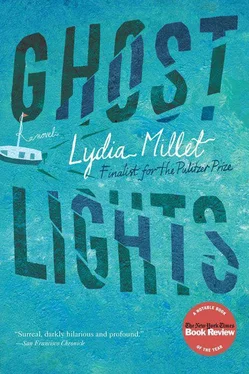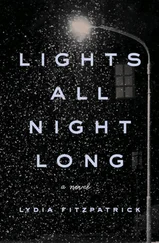Lydia Millet - Ghost Lights
Здесь есть возможность читать онлайн «Lydia Millet - Ghost Lights» весь текст электронной книги совершенно бесплатно (целиком полную версию без сокращений). В некоторых случаях можно слушать аудио, скачать через торрент в формате fb2 и присутствует краткое содержание. Издательство: W. W. Norton & Company, Жанр: Современная проза, на английском языке. Описание произведения, (предисловие) а так же отзывы посетителей доступны на портале библиотеки ЛибКат.
- Название:Ghost Lights
- Автор:
- Издательство:W. W. Norton & Company
- Жанр:
- Год:неизвестен
- ISBN:нет данных
- Рейтинг книги:5 / 5. Голосов: 1
-
Избранное:Добавить в избранное
- Отзывы:
-
Ваша оценка:
- 100
- 1
- 2
- 3
- 4
- 5
Ghost Lights: краткое содержание, описание и аннотация
Предлагаем к чтению аннотацию, описание, краткое содержание или предисловие (зависит от того, что написал сам автор книги «Ghost Lights»). Если вы не нашли необходимую информацию о книге — напишите в комментариях, мы постараемся отыскать её.
How the Dead Dream
Ghost Lights
Ghost Lights
Ghost Lights — читать онлайн бесплатно полную книгу (весь текст) целиком
Ниже представлен текст книги, разбитый по страницам. Система сохранения места последней прочитанной страницы, позволяет с удобством читать онлайн бесплатно книгу «Ghost Lights», без необходимости каждый раз заново искать на чём Вы остановились. Поставьте закладку, и сможете в любой момент перейти на страницу, на которой закончили чтение.
Интервал:
Закладка:
“I’ve been giving it to the ocean. Piece by piece. I figure it could be an artificial reef. You know, like the old tires they sink in some places, or the wrecks, and then the fish come and inhabit them.”
Hal looked at him. He seemed sincere, but maybe there was something absent about him. Maybe he wasn’t all there. Like mother, like son, finally. It made perfect sense, of course, with the sunburnt castaway look and the whole tropical island, spurning-society deal.
“Wait. So this is why you haven’t called anyone? This is what you’re — you know, with your business losing money and all that this whole time? So you can personally, like, lug the wreckage of your hotel into the water?”
“Well, when you put it that way,” said T. lightly, smiling, and then gazed past him. “I mean, losing money — so yeah. It’s OK, finally. All my life I thought that was the worst thing that could happen to you.”
“Uh huh,” said Hal. He waited.
“I thought money was real.”
Poor guy.
“Well, I tell you,” said Hal mildly, as though speaking to an infant. “Admittedly I’m biased, being an IRS man. But I can’t think of a lot of things realer than money. I mean, to most people money is life and death.”
“So that’s two things right away. Life. And death.”
“I don’t really follow you.”
“They’re both more real. Living for money is like living for, I don’t know, a socket wrench. Unless you’re going to do something specific with it, it’s a complete waste of time. Obvious to some people, I realize. But I just now figured it out.”
“Sure. Hey, I get it. You’re talking to a civil servant here. So obviously I’m no high-earning capitalist. I’ve seen what money can do, though. Take income tax revenues. Social programs.”
“That’s not what income tax revenues do,” said T. softly. “Social Security has its own—”
“Not primarily, maybe—”
“Primarily, taxes pay for weapons. Weapons and war. Always have, always will.”
A straw man. Statistically, it was far more complicated than that. Hal could break it down for him. Basic protester stuff.
“Well, tech—”
“I know. Weapons, war, and please don’t forget the D.O.T.”
“As a percentage of—” started Hal, but the guy was shaking his head.
“Hey. Can I show you something?” he asked. “I’ve also been building the tree-house. I’m using some of the hotel materials for that. This is an island caye, palm trees and sand, which is what made it buildable in the first place. You know, some of the cayes around here are only mangrove, no real ground to build on. Mostly water. This one is island but it has a lot of mangrove vegetation too, kind of a mangrove-swamp thing on the east side, and the west side is solid ground. Right here we’re phasing into mangrove, and those are mostly scrubby. But I found one tree that was tall enough, that was it. Come here,” and he rose and Hal followed him, both with their cups of wine in hand.
There were rough steps up the tree with the lean-to beside it, pieces of wood hammered clumsily onto the narrow trunk. Whatever else the guy was, he was no carpenter.
At the top there was a platform, several layers of plywood with holes cut in them for the topmost limbs, which stuck out like grasping arms. Hal pulled himself up behind T., unsteady.
“Is this thing safe?” he asked.
T. shrugged. “Enough.”
They both stood looking out over the mangroves, over the low tangle of vegetation eastward to the open ocean. Nothing around them but air; at only twenty feet up they were the highest point for miles.
Hal saw a huge ship far out on the water, dazzling with light.
“Cruise ship, huh,” he said.
“You can see from here to the utter east,” said T. softly. “All the world ends in sea.”
The wind picked up the branches of the trees that ringed their clearing, swept through and subsided again.
“Right,” said Hal.
So the guy was maybe not doing too well, mental-wise. It happened. He had been in an extreme situation — lost in the jungle, pretty much. He had a little breakdown, or maybe an epiphany; he found God, he saw the error of his ways, he renounced the accumulation of capital. Good, fine, and even excellent. More power to him. Let him become ascetic, live in a small hut with zero Armanis. At last Susan could stop working for him.
Hal’s new fondness was a pleasant enough sensation. The man who used to be Stern had a gentle demeanor now, or that was what it felt like. Maybe Hal could even serve as his advocate with the Belize authorities, if it turned out he had committed a crime. If he had, for instance, murdered the tour guide, say, and that was why he had spiraled out of control and was building tree-houses and forgoing personal grooming. Hal could stand beside him like a brother.
He drank his wine and felt the cool breeze on his face and the warmth in his throat.
“Not a bad place to be,” said T. “Is it?”
But wait, maybe this was why Marlo had asked if he was a lawyer. When he first woke him up by the pool, Marlo had asked if he was a lawyer. Maybe the guy knew he needed a lawyer. Maybe Marlo had already called for one.
“Not at all,” he concurred, and looked up into the dark blue. It was light up here, the wind lifted you as though you could soar or fall, and let it, you wouldn’t mind. Stars were visible, but soft and washed out by the water in the air, not like infinite separate pinpoints he’d seen once in the desert.
They had gone camping in Joshua Tree one weekend, Susan and he, not so long after the accident, because they had to get out, they had to go anywhere, they had to escape, and it was the closest empty place they’d heard of. Casey was in rehab then — the physical therapy kind, not the drug-using. They’d driven east on the interstate out of L.A., through the miles and miles of industrial sprawl and car dealerships flying their advertising blimps in the gray, smoggy sky along the crowded freeway. Finally they pulled up outside the visitors’ center and sure, there was concrete, just like at home, the concrete parking lot; but beyond it there was sand and sand and mountains and sky, and there was air all around them, plenty of room to breathe. The spiky cactus-trees were everywhere, the low mountains, the campsites with gigantic boulders.
What he remembered now from that trip, besides the stars, was how they hardly spoke, he and Susan, they hardly talked at all. But it was not bad, it was not a measure of distance, or it hadn’t been back then. It was restful and good, peace in the wake of a long struggle.
Their borrowed tent had a transparent window in the top of it. He had lain there on his back at night, on top of his sleeping bag, and gazed out at the stars while Susan slept beside him. He thought they’d never looked so clear, and there had never been so many.
Casey would like this tree-house, he thought; Casey would love it here. She had looked into flying, flying in a glider. There was a program that could take her up in the sky. She hadn’t done it yet, but she still could. He would call her and say do it, do it. To know that lightness. . it was not the running, not a vision of her once in a race, say, her slim young legs flying, though there had been times like that and he remembered them well enough. Field Day at school, when she was in the hundred-yard dash: he loved to watch her but she complained both before and after the race, even holding her purple ribbon. She did not like running. Hard to believe while he was watching her go, it so closely resembled joy. . or flying a kite once, on a beach in Cape Cod, her feet kicking up sand on him. There were cliffs near them and the water was far too cold for swimming.
But that was not what distressed him, the memories of running. Only the simple memory of her face — her face without tension, without strain or grief.
Читать дальшеИнтервал:
Закладка:
Похожие книги на «Ghost Lights»
Представляем Вашему вниманию похожие книги на «Ghost Lights» списком для выбора. Мы отобрали схожую по названию и смыслу литературу в надежде предоставить читателям больше вариантов отыскать новые, интересные, ещё непрочитанные произведения.
Обсуждение, отзывы о книге «Ghost Lights» и просто собственные мнения читателей. Оставьте ваши комментарии, напишите, что Вы думаете о произведении, его смысле или главных героях. Укажите что конкретно понравилось, а что нет, и почему Вы так считаете.












